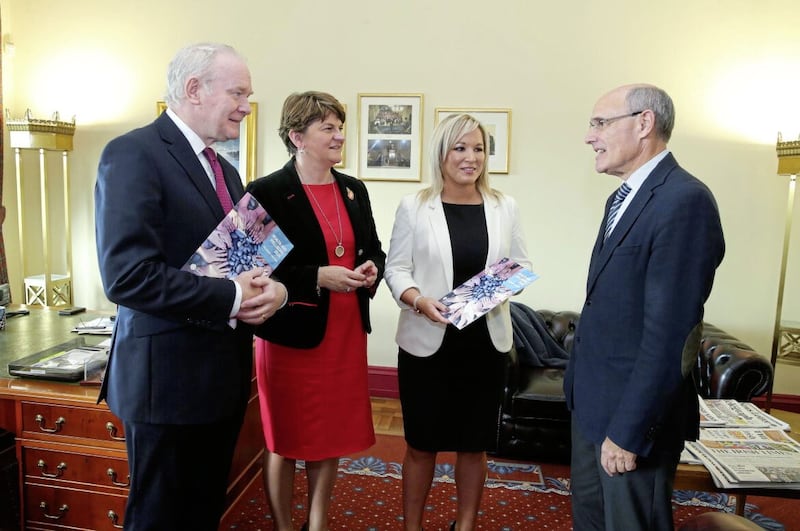The beginning of 2024 marked a watershed moment in the history of the NHS in the north, as Dr Tom Black opened the first hybrid public-private GP surgery.
This was the well-known Derry man’s innovative response to the deepest ever crisis in primary care.
Last Tuesday morning his Abbey Street medical practice welcomed its first ever private patients.
Individuals who are not registered with this practice now have the option to access a GP appointment for a £75 fee.
Significantly, Dr Black and his partners will not be paid for offering this service. It is not a side hustle, nor a nice little earner, but entirely voluntary.
In order to bring in much-needed funds they have introduced a private practice running in parallel to the existing one. A system similar to the one in dentistry.
Decreased funding , increased need in our community and a workforce crisis demands innovation. There is no such thing as an innocent bystander. Self sufficiency and community action will have to fill the political vacuum. https://t.co/hrWfAMcauu
— Tom Black (@TomblackBlack) January 4, 2024
Registered NHS patients will be seen as usual, without charge. All of the money that is earned through the private initiative will go directly to keeping the surgery afloat.
In the last 12 months a record number of practices handed back their contracts to the Department of Health. An unprecedented number of doctors have decided that they can no longer weather the storm of managing medical practices.
Relentless stress caused by a combination of a lack of sustainable funding, austerity measures, rising demand and difficulties associated with recruiting and retaining staff has led to punishing, unsafe workloads. Job satisfaction has plummeted, and risk is increasing.
The numbers being recruited are not matched by the numbers heading for the door. Young medics are turning their backs on general practice, opting instead to work in EDs or as locums. The rate of early retirement is double the rate seen five years ago. GPs are the beating heart of the health service, professionals closest to patients and their families, providing holistic care and continuity. Serving at the heart of their communities. However, many are no longer able to do the very thing that made this a special and desirable career.
The numerous challenges facing GP practices show no signs of receding. Primary care services are picking up the pieces of years of underinvestment in social and community care, alongside savage cuts to mental health budgets.
The knock-on effect of record waiting lists in the north is hard to overstate. Hospital backlogs mean that GPs are having to manage people and their deteriorating health for longer.
In England, waits of over 18 months have almost been eliminated. Here, waits of up to eight years are commonplace. This avoidable workload also brings a significant psychological burden for these medics who are the first point of contact for exasperated patients.

A broken funding model, increased costs linked to inflation and heavier and more complex workloads pose a serious risk to general practice as we know it. Repeated calls for help have fallen on deaf ears.
The healthcare system has been spectacularly failed by our local politicians. A grim tale of broken promises and political cowardice coupled with a lack of vision and strategic planning.
Decades of inertia and dithering have been compounded by the latest political impasse.
The Bengoa plan was published in 2016. If it had been implemented, we would be eight years into a 10-year plan for transformation. Just imagine how different things could be.

Instead, in the absence of leadership, we are condemned to watching health and social care fall apart. People are dying prematurely, in pain and distress.
Dr Black is not new to this game. The chair of BMA’s NI Council and former GP of the Year has worked in the Bogside and Brandywell inner city area of Derry for over 35 years, an area marked by high levels of deprivation and poverty. His Abbey Street medical practice serves over 6,900 patients. Dr Black’s tenacity and refusal to throw in the towel is to be admired. With imminent closure looking inevitable, this hybrid public/private model provides at least the possibility of a temporary respite.
It is an experiment that will be watched with much interest by medical professionals across the UK.
The healthcare system has been spectacularly failed by our local politicians. A grim tale of broken promises and political cowardice coupled with a lack of vision and strategic planning.
However, asking already overworked, exhausted, stressed GPs to work on their holidays or non-rotated days in order to provide an essential service is neither acceptable nor sustainable.
Good will can only last so long. We can’t go on like this. Something has to give.
We do not have to be fatalistic about the future. This crisis can be reversed with political will, beginning with acknowledging the scale of the problem and tackling it with urgency and a relentless focus on transformation.
Billions will not bail us out, if we keep doing things the same way and expect different outcomes.


